Art McDonald delivers Herzberg Lecture at CAP

It started with a bang (the Big Bang, that is) and ended among the stars.
Dr. Arthur B. McDonald was featured in last nights Herzberg Memorial Public Lecture speaking on the deep dark questions of our universe.
Queen’s University took on hosting this year’s Canadian Association of Physicists Annual Congress to correspond with their 175th anniversary celebration. The CAP Congress is the most important physics conference in Canada. Every year, hundreds of Canadian and international physicists descend on the host university to communicate, present, exchange ideas, promote new research, and discuss the role of physics in Canada. This science-filled week also includes a Public Lecture with a speaker chosen for their merit, his or her impact on the physics community and dedication to inspiring the next generation of young innovators.
The lecture was named the Herzberg Memorial Public Lecture in honour of Nobel Laureate Dr. Gerhard Herzberg, longstanding member of the CAP, in recognition of Dr. Herzberg’s known desire to increase public science engagement and appreciation of science amongst the public, particularly among youth.
Dr. McDonald continued this theme by appealing to the younger members of the audience with jokes, a promise that “science is fun,” and reminding everyone that they are sitting in a room full of “geeks looking for WIMPs” (weakly interacting massive particles). Peppering whimsy throughout his talk, Dr. McDonald gave an overview of SNOLAB’s new neutrino experiment, SNO+, as well as the current dark matter programme underway there.
McDonald also discussed the history of the now completed SNO experiment, making sure he gave credit to the 270+ people who made it possible. He made a point to acknowledge that over 200 of the collaborators were students and post-docs; reinforcing that contributions from all levels are important. For their work and discoveries on neutrinos McDonald and his group were awarded the 2015 Nobel Prize in physics along with Takaaki Kajita.
After the completion of the SNO experiment the facility was expanded into SNOLAB with funding from the Canada Foundation for Innovation, a programme designed to “welcome the world to Canada”. McDonald reiterated the importance of this initial investment and pushed home the message that “we need to be global in our outlook, in our diversity and our collaborations”.
To wrap things up, McDonald asked for SNO-jokes from the crowd and shared a quote that has stuck with him since his days at Princeton working under Nobel Laureate, Professor Willy Folwer:
“Ad astra per aspera et per ludum – to the stars with hard work and fun!”
Samantha Kuula
Communications Officer
SNOLAB
skuula@snolab.ca
(705) 692-7000 x2222